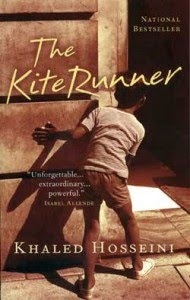The book starts with Amir talking to us from his grown up life. I know this because I have read
 the book before. In the first chapter, we are back in Kabul, where Amir grew up. This is a novel about a boy who really wants to be acknowledged by his father, Baba. Baba doesn’t give Amir enough attention, and Amir feels like a stranger in his own house. He explains this as “At the dinner table, the only thing speaking, was the silverware against the plates.” He finds support in Hassan, the servant’s boy. He and his father, Ali, is descended from the Hazara people. They are treated like dogs by every Afghan, but at Amir’s house, Ali and Hassan are treated with as much respect as a servant can get. The thing that bothers Amir the most is that Baba keeps a nice eye at Hassan at all times, as if Hassan was his son, and not Amir…
the book before. In the first chapter, we are back in Kabul, where Amir grew up. This is a novel about a boy who really wants to be acknowledged by his father, Baba. Baba doesn’t give Amir enough attention, and Amir feels like a stranger in his own house. He explains this as “At the dinner table, the only thing speaking, was the silverware against the plates.” He finds support in Hassan, the servant’s boy. He and his father, Ali, is descended from the Hazara people. They are treated like dogs by every Afghan, but at Amir’s house, Ali and Hassan are treated with as much respect as a servant can get. The thing that bothers Amir the most is that Baba keeps a nice eye at Hassan at all times, as if Hassan was his son, and not Amir…Every winter, Afghanistan’s children perform the Kite fights. The game consists of children with Kites, and the point is to try and cut the opponents kite down, and be the last kite flying. In the winter of 1975, Amir wins this tournament, and Baba is very proud. Another part of the tournament is to run for the fallen kites. The children station themselves at different spots around the city to try and get a head start. Hassan is the best of these Kite Runners. This day, Hassan runs for the last kite for Amir. As he runs to the opposite corner of the square where the championship where held, Hassan turns his head and calls: “For you, a thousand times over”. I think that one sentence summarize Hassan’s personality. He does anything for Amir, his best friend in the whole world.
Amir, at the other hand, teases Hassan all the time, and is a coward himself. He never stands up for Hassan, even when he is raped by Assef in a shabby alley. Hassan is there to pick up the kite for Amir, and Assef and two other guys gets there and tease him. They try to force him to give them the kite, but Hassan says “The kite is for Amir”. What Hassan doesn’t know, is that Amir stands and watches the whole episode, and then runs...
After this, Amir is driven by guilt for not interfering. It ends with Hassan saying: “I don’t know what I have done, Amir agha. I wish you’d tell me (...) You can tell me, I’ll stop doing it.” This statement from Hassan kills me inside, every single time I read it. How can a person be so kind? He scarified himself for Amir and that stupid kite, and all Amir was able to do was to run for his life! That's enough for this time, and I’ll try not to rip Amir to peaces until next time…
(The picture is the oridginal cover of the book, and I found it at: www.thebookclubblog.co.za/?p=688 (19.09.10)
Well said, it is so heartbreaking to read about Hassan and his devotion for Amir and how little he gets in return. I'm glad you mentioned the sentence "for you a thousand.. " it is a very vital part of the story. I can see that you really are into this book. Good for you!
ReplyDelete